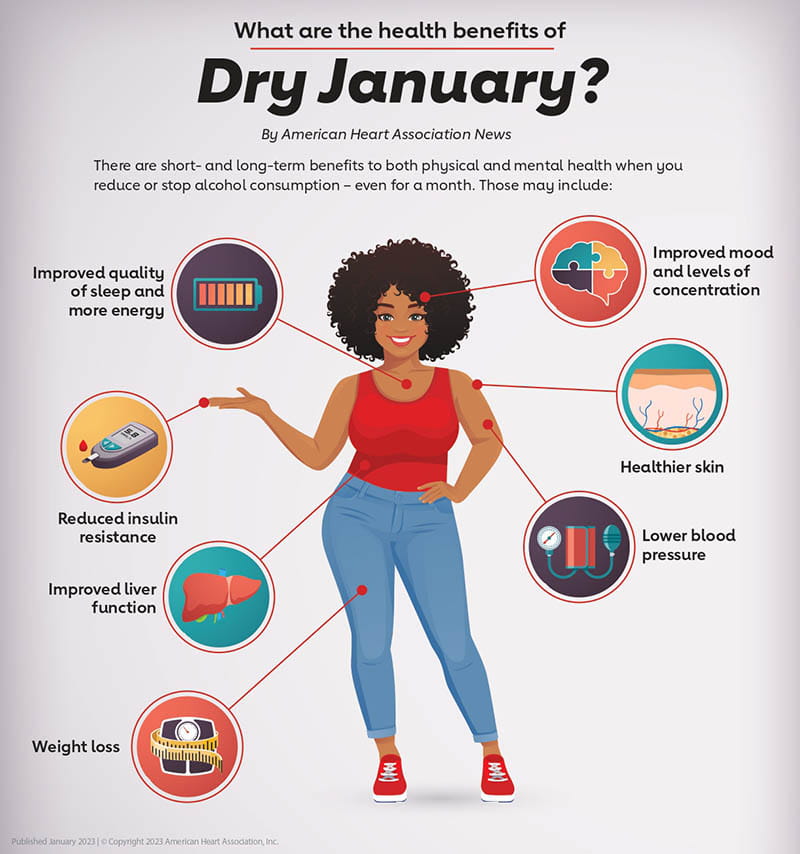Introduction
Dry January has become a popular trend in recent years, with many individuals opting to abstain from alcohol for the entire month. It serves as a detox period after the indulgence of the holiday season and offers numerous health benefits. Let’s delve into the concept and explore the advantages it brings.
History of Dry January
Originating in the United Kingdom, Dry January began as a campaign by the charity Alcohol Change UK in 2013. It aimed to encourage people to rethink their relationship with alcohol and kickstart the new year on a healthier note. Since then, the movement has gained traction globally, with millions of participants each year.
Health Benefits of Dry January
Improved Liver Function
One of the most notable benefits of abstaining from alcohol for a month is the positive impact on liver health. Alcohol consumption, especially in excess, can strain the liver and lead to fatty liver disease and inflammation. By giving your liver a break, you allow it to repair and regenerate, improving its function in the long run.
Weight Loss
Alcoholic beverages are often high in calories and can contribute to weight gain. By cutting out alcohol for a month, individuals may notice a reduction in their calorie intake, leading to weight loss and a trimmer waistline.
Better Sleep Quality
Alcohol disrupts sleep patterns and can interfere with the body’s ability to enter deep, restorative sleep. By abstaining from alcohol, participants may experience improved sleep quality, waking up feeling more refreshed and energized.
Mental Clarity and Focus
Alcohol consumption can impair cognitive function and hinder mental clarity. During Dry January, individuals often report feeling sharper and more focused, as alcohol-induced brain fog lifts.
Impact on Overall Well-being
Increased Energy Levels
Without the depressant effects of alcohol, participants often find themselves with higher energy levels throughout the day. This newfound vitality can fuel productivity and physical activity.
Enhanced Mood
Alcohol is known to exacerbate mood swings and contribute to feelings of depression and anxiety. By eliminating alcohol from their lives, participants may experience a more stable mood and an overall sense of well-being.
Reduction in Anxiety
Many people turn to alcohol as a coping mechanism for stress and anxiety. However, alcohol can actually worsen anxiety symptoms in the long run. By abstaining from alcohol, individuals may find healthier ways to manage stress and anxiety, leading to a calmer demeanor.
Social and Emotional Effects
Strengthening of Relationships
Participating in Dry January can foster stronger connections with friends and family members who are also taking part in the challenge. Shared experiences and mutual support can deepen relationships and create lasting bonds.
Building Healthier Habits
Breaking the habit of reaching for a drink in social situations can lead to the formation of healthier habits. Participants may discover new activities and hobbies that don’t revolve around alcohol, promoting a more balanced lifestyle.
Personal Growth
Completing health polo.com/ requires commitment and self-discipline. By successfully abstaining from alcohol for a month, individuals can gain a sense of accomplishment and build confidence in their ability to make positive changes in their lives.
Tips for Successfully Completing Dry January
Setting Realistic Goals
Rather than aiming for perfection, set achievable goals for yourself during Dry January. Focus on progress rather than perfection and celebrate small victories along the way.
Finding Alternative Beverages
Explore non-alcoholic alternatives such as mocktails, herbal teas, and infused water to satisfy cravings and stay hydrated throughout the month.
Engaging in Supportive Communities
Join online forums or local support groups to connect with others who are participating in Dry January. Sharing experiences and receiving encouragement from peers can make the journey more enjoyable and rewarding.
Challenges and How to Overcome Them
Social Pressure
Navigating social situations without alcohol can be challenging, especially when faced with peer pressure. Be prepared to explain your decision to friends and politely decline offers of alcohol if it doesn’t align with your goals.
Coping Mechanisms
Find healthy ways to cope with stress and boredom that don’t involve alcohol. Engage in activities such as exercise, meditation, or creative hobbies to distract yourself and alleviate cravings.
Seeking Professional Help if Needed
If you find it difficult to abstain from alcohol or experience withdrawal symptoms, don’t hesitate to seek support from a healthcare professional or addiction counselor. They can provide guidance and resources to help you stay on track.
Long-term Effects and Sustainability
Carryover Benefits Beyond January
The benefits of Dry January don’t end on January 31st. Many participants report carrying over healthier habits and decreased alcohol consumption into the following months, leading to long-term improvements in their health and well-being.
Incorporating Moderation into Daily Life
While the goal of Dry January is temporary abstinence, it can serve as a catalyst for more mindful drinking habits year-round. By practicing moderation and being mindful of alcohol consumption, individuals can enjoy the occasional drink without overindulging.
Conclusion
Dry January offers a multitude of health benefits, from improved liver function and weight loss to enhanced mood and relationships. By taking a break from alcohol for just one month, individuals can kickstart the new year on a healthier note and set the stage for long-term well-being.

